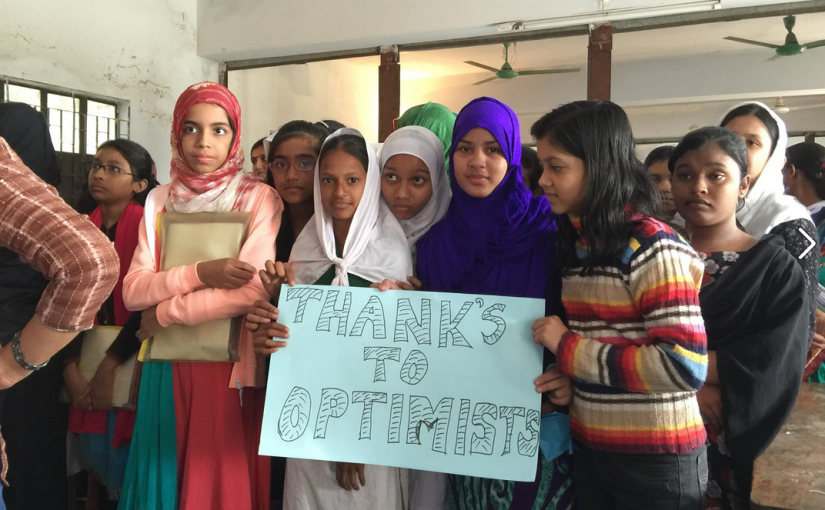The pictures are horrifying… the sort that newspaper editors decide not to publish, for reasons of taste and human dignity (and subscriber backlash).
Faces of lifeless children caked in concrete dust, bodies buried in rubble. Female arms and legs protruding from pancaked concrete floors of the crumpled factory, colourful clothing contrasting against the grey ruins. Rescuers tugging heroically, too often fruitlessly. Sudden, catastrophic death everywhere.
The collapse of the eight-storey Rana Plaza clothing factory in the Savar district of Dhaka, Bangladesh on April 24, 2013, killed 1,129 people, most of them young women. Another 2,515 were injured or maimed. The event shocked the world and put a searing spotlight on the worst excesses of global capitalism and blind consumerism.
For The Optimists, a Bangladesh-focused diaspora charity formed in 2000, Rana Plaza was just the latest call to action, if the most tragic in scale. The organization quickly posted graphic photos on its website as it reached out to supporters for donations.
The Optimists (not to be confused with Optimist International clubs) was established by ex-pat professional Bangladeshis living in New York City. Most of the founders have finance, medicine, or business backgrounds. They represent an increasingly mobile global professional class that has greatly influenced the modern evolution of diaspora philanthropy.
“During the information revolution of the 1980s and 1990s, a new generation of philanthropists emerged from the booming finance and information technology industries,” note the authors of Diaspora Philanthropy: Private Giving and Public Policy, a 2010 study published by Washington, D.C.-based Migration Policy Institute. “In the first decade of the twenty-first century, strong economic growth in emerging economies (particularly in South and East Asia) led to the emergence of new philanthropists with direct ties to the developing world.”
Helping The Optimists and diaspora philanthropists everywhere is a powerful tool that an early ex-pat philanthropist, the Scot-American Andrew Carnegie, could not possibly have imagined: the Internet. The charity maintains a website, offers online donations, runs a Facebook page, operates a blog, and publishes online videos. Material is published in both English and Bengali. The Internet “is making it possible for dispersed populations to organize, collaborate, and nurture ties across borders,” observe the authors of Diaspora Philanthropy.
The goal of The Optimists is to both address the symptoms of poverty and also its causes. The group provides underprivileged students with the means to continue their education. The Child Sponsorship Program, for a $135 USD annual donation, funds a student from grade 6 through grade 10. The Special Sponsorship Program is similar. A $310 annual donation supports a student from grade 11 through to a bachelor degree. Candidate students must show promise and must be from “underprivileged, distressed, dispossessed, orphaned, deprived, broken and/or vulnerable families,” according to the group’s website.
“Many children from rural areas in Bangladesh are unable to attend school in their villages because their parents can’t afford it,” says Fahmida (Farah) Ahmed, a New York-based volunteer for The Optimists. “They barely have enough money to sustain life. Most people barely even make a dollar a day in those areas. So sending their kids to school is luxury, not a priority.”
After the Rana Plaza disaster, The Optimists focused on supporting students directly affected by the loss or maiming of mothers or sisters who supported them. On January 17, 2014, the organization announced at an event in Dhaka that it had raised funds to support 81 students in its “Rescue Savar’s Future” program.







